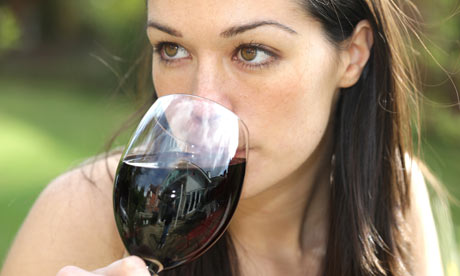
Women who drink a glass of wine a day are more likely to develop a range of cancers than are teetotallers, according to the largest study ever conducted into drinking and cancer.
A daily drink was found to significantly raise the risk of breast, liver and rectal cancer, and is estimated to account for more than 7,000 extra cases of cancer each year in the UK.
Researchers at the University of Oxford said the findings, which are part of the Million Women Study, make clear that even light, regular drinking can be a serious threat to health.
Naomi Allen, a cancer epidemiologist who led the research, used medical records to identify cases of cancer among a group of 1,280,296 middled-aged women. Of the women who drank, the average intake was one unit per day, the equivalent to a small glass of wine or 8g of alcohol. A pint of beer would count as two units. Very few of the women consumed more than three drinks a day.
Over a seven-year period, 68,775 women were diagnosed with cancer.
While alcohol seemed to reduce the risk of some very rare cancers, such as kidney, non-Hodgkin lymphoma and thyroid tumours, it raised the risk of others. For every 1,000 women, drinking regularly once a day was linked to 11 extra breast cancers, one more oral cancer and one additional case of rectal cancer each year. Cases of oesophageal, laryngeal and liver cancer all rose by 0.7 extra cases per 1,000 women up to the age of 75. The increase in cancer risk was the same whether women drank wine, beer, spirits or a mixture.
"In the UK, cancers of breast, liver, rectum, mouth and throat together number about 118 per 1,000 women each year. Having one drink a day would cause 15 extra cases of cancer per 1,000 women [per year] up to the age of 75," Allen told the Guardian. Drinking twice a day would lead to a doubling of extra cases to 30. The research is published in the Journal of the National Cancer Institute.
Smoking is still by far the largest single cause of cancer, accounting for around one third of all diagnosed cases. Diet and diet-related factors, such as obesity, are thought to explain a further third, with alcohol accounting for around 5% of cancers.
"It's for the government and Department of Health to make and change public health guidelines, but given that this is the largest study in the world to look at this, it's clear that even at low levels of alcohol consumption, there does seem to be a very significant increase in cancer risk, and most women are probably not aware of that," said Allen.
"Alcohol intake has less of an impact on cancer rates than smoking, but it's still hugely significant and it's something people can modify if they want to. People have to be informed that it increases their cancer risk so they can take responsible action."
In an editorial published alongside the research, Michael Lauer and Paul Sorlie at the National Heart, Lung and Blood Institute in Maryland, US, write: "From the standpoint of cancer risk the message of this report could not be clearer. There is no level of alcohol consumption that can be considered safe."
Sara Hiom at Cancer Research UK said: "We know that too much alcohol increases the risk of a number of cancers. This latest study shows that even relatively low levels of drinking increase a woman's risk ... The more you cut down on alcohol, the more you reduce your cancer risk."
• This article was amended on Monday 2 March 2009. We originally said a study had found that one alcoholic drink consumed a day causes 15 extra cases of cancer per 1,000 women per year. This was wrong. It caused 15 extra cases per 1,000 women up to the age of 75. This has been corrected

